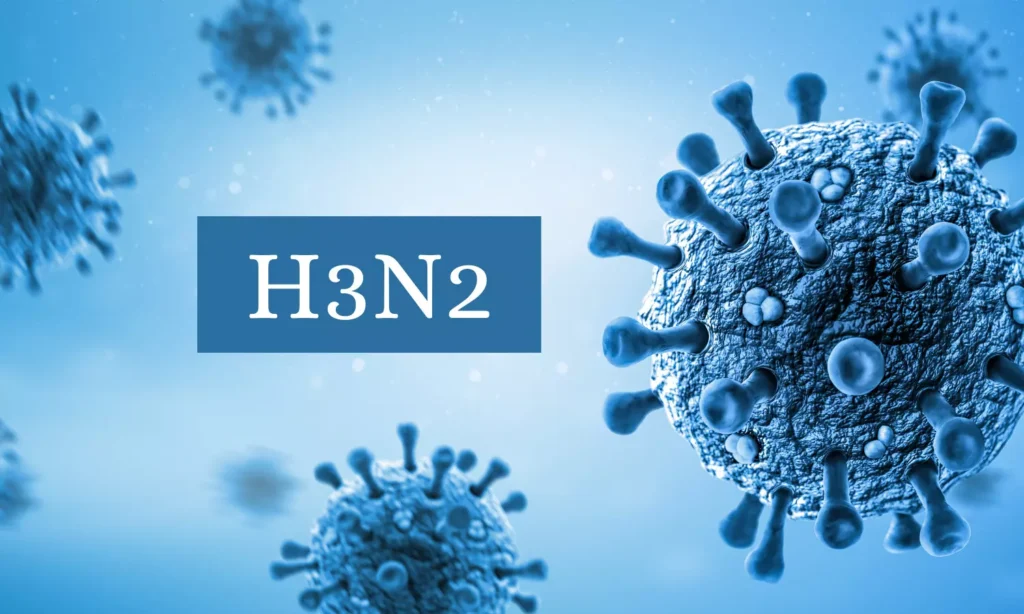H3N2 is a subtype of the influenza A virus. It is also known as the “Hong Kong flu” because it was first identified in Hong Kong in 1968. H3N2 is a highly infectious respiratory illness that can cause flu-like symptoms in humans, such as fever, cough, sore throat, body aches, and fatigue. It is transmitted through respiratory droplets when an infected person coughs, sneezes, or talks, and can also be transmitted by touching contaminated surfaces and then touching the mouth, nose, or eyes. H3N2 can cause severe illness and even death, particularly in older adults and individuals with weakened immune systems. Vaccines are available to help prevent infection with H3N2, but they may not be effective against all strains of the virus.

H3N2 is a type of influenza virus that can cause respiratory illness in humans. While there is no specific cure for H3N2, there are several home remedies, do’s and don’ts, and precautions that can be taken to alleviate symptoms and prevent the spread of the virus.
H3N2 Symptoms
The symptoms of H3N2 are similar to those of other types of influenza and can vary in severity. Some common symptoms of H3N2 may include:
- Fever: A high fever (above 100.4°F or 38°C) is often the first sign of H3N2 infection.
- Cough: A dry or productive cough may develop, which can be persistent and severe.
- Sore throat: A sore throat may be present, and can be accompanied by difficulty swallowing.
- Body aches: Muscle and body aches, often severe, may occur.
- Fatigue: Extreme tiredness or exhaustion is a common symptom of H3N2.
- Headache: A headache, often severe, may develop.
- Nasal congestion: Nasal congestion or a runny nose may be present.
In some cases, H3N2 can lead to more severe complications, such as pneumonia, bronchitis, and sinus infections. Individuals with weakened immune systems or underlying health conditions may be more susceptible to these complications. It is important to seek medical attention if symptoms persist or worsen, or if you develop more severe symptoms such as difficulty breathing or persistent chest pain.
Home Remedies
While there is no specific cure for H3N2, there are several home remedies, do’s and don’ts, and precautions that can be taken to alleviate symptoms and prevent the spread of the virus.
- Rest: Get plenty of rest to allow your body to recover from the virus.
- Hydration: Drink plenty of fluids to keep yourself hydrated and to help loosen mucus in the throat and chest.
- Steam inhalation: Inhaling steam from hot water or a humidifier can help soothe a sore throat and reduce congestion in the lungs.
- Saltwater gargle: Gargling with warm saltwater can help relieve a sore throat and reduce inflammation.
- Honey: Consuming honey can help relieve cough and soothe the throat.
Do’s of H3N2
- Wash your hands regularly: Regularly washing your hands with soap and water can help prevent the spread of the virus.
- Cover your mouth and nose: Cover your mouth and nose with a tissue or your elbow when coughing or sneezing to prevent the spread of the virus.
- Wear a mask: If you are infected with H3N2, wear a mask to prevent the spread of the virus to others.
- Take medications as prescribed: If your doctor has prescribed antiviral medication for H3N2, take them as directed.
Don’ts of H3N2
- Avoid contact with others: Avoid close contact with others to prevent the spread of the virus.
- Don’t share personal items: Do not share personal items such as towels, utensils, or drinks to prevent the spread of the virus.
- Don’t smoke: Smoking can worsen respiratory symptoms and increase the risk of complications from H3N2.
Precautions of H3N2
- Get vaccinated: Getting vaccinated against the flu can help prevent infection with H3N2.
- Avoid crowded places: Avoid crowded places where the virus may be easily transmitted.
- Stay home if sick: If you are sick, stay home to avoid spreading the virus to others.
- Maintain a healthy lifestyle: Maintain a healthy lifestyle with regular exercise, a balanced diet, and adequate sleep to boost your immune system.
It is important to note that while home remedies and precautions can help alleviate symptoms and prevent the spread of H3N2, individuals with severe symptoms should seek medical attention immediately. Severe symptoms may include difficulty breathing, persistent fever, and chest pain.
Guidelines for H3N2
Guidelines for H3N2 are important for preventing the spread of the virus and treating the symptoms. Here are some guidelines to follow:
- Get vaccinated: The best way to prevent H3N2 is to get vaccinated. The flu vaccine can help protect you from getting infected or reduce the severity of the illness if you do get infected.
- Wash your hands: Washing your hands frequently with soap and water can help prevent the spread of the virus.
- Cover your mouth and nose: Cover your mouth and nose with a tissue or your elbow when you cough or sneeze to prevent the spread of the virus.
- Stay home if you’re sick: If you’re experiencing symptoms of H3N2, stay home to prevent spreading the virus to others.
- Stay away from sick people: Avoid close contact with people who are sick, especially those who have been diagnosed with H3N2.
- Wear a mask: If you’re infected with H3N2, wearing a mask can help prevent the spread of the virus to others.
- Stay hydrated: Drinking plenty of fluids can help keep you hydrated and alleviate symptoms such as cough and sore throat.
- Get rest: Getting enough rest is important to help your body recover from the virus.
- Take antiviral medications: Antiviral medications can help treat the symptoms of H3N2 and shorten the duration of the illness. It is important to take them as prescribed by your doctor.
- Follow medical advice: If you have severe symptoms or are at a higher risk for complications from H3N2, it is important to follow your doctor’s advice on treatment and prevention.
By following these guidelines, you can help prevent the spread of H3N2 and reduce the severity of symptoms if you do become infected. It is important to seek medical attention if you experience severe symptoms or if symptoms persist or worsen.
FAQ’s
Here are some frequently asked questions about H3N2:
Q: What is H3N2?
A: H3N2 is a type of influenza virus that can cause respiratory illness in humans.
Q: What are the symptoms of H3N2?
A: The symptoms of H3N2 are similar to those of other types of influenza and can include fever, cough, sore throat, body aches, fatigue, headache, and nasal congestion.
Q: How is H3N2 spread?
A: H3N2 is spread through respiratory droplets when an infected person coughs or sneezes. It can also be spread by touching contaminated surfaces and then touching your mouth, nose, or eyes.
Q: How is H3N2 diagnosed?
A: H3N2 is diagnosed through a laboratory test of respiratory secretions or blood samples.
Q: How is H3N2 treated?
A: Treatment for H3N2 typically involves rest, staying hydrated, and taking over-the-counter medications to alleviate symptoms. Antiviral medications may also be prescribed in some cases.
Q: Who is at risk for complications from H3N2?
A: People with weakened immune systems, chronic health conditions, and the elderly are at a higher risk for complications from H3N2, including pneumonia and other respiratory infections.
Q: How can H3N2 be prevented?
A: H3N2 can be prevented by getting vaccinated, washing your hands frequently, avoiding close contact with sick people, covering your mouth and nose when you cough or sneeze, and staying home if you’re sick.
Q: Can H3N2 be fatal?
A: H3N2 can lead to severe complications, including pneumonia, which can be fatal, particularly in high-risk individuals.
Q: Is H3N2 the same as COVID-19?
A: No, H3N2 is a type of influenza virus, while COVID-19 is caused by the SARS-CoV-2 virus. However, both can cause respiratory illness and have similar symptoms.
Conclusion
In conclusion, H3N2 is a type of influenza virus that can cause respiratory illness in humans. The symptoms of H3N2 are similar to those of other types of influenza and can include fever, cough, sore throat, body aches, fatigue, headache, and nasal congestion. H3N2 can be spread through respiratory droplets and by touching contaminated surfaces. Treatment for H3N2 typically involves rest, staying hydrated, and taking over-the-counter medications to alleviate symptoms. Antiviral medications may also be prescribed in some cases. Prevention measures include getting vaccinated, washing your hands frequently, avoiding close contact with sick people, covering your mouth and nose when you cough or sneeze, and staying home if you’re sick. It is important to seek medical attention if you develop symptoms of H3N2, particularly if you are at a higher risk for complications. By taking appropriate precautions and seeking timely treatment, you can help reduce the spread of H3N2 and protect yourself and those around you.



